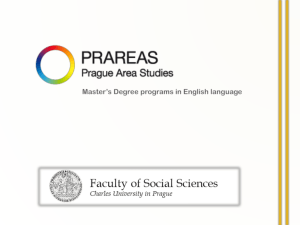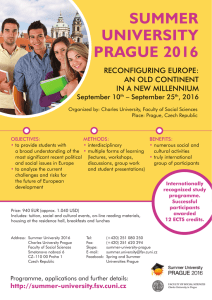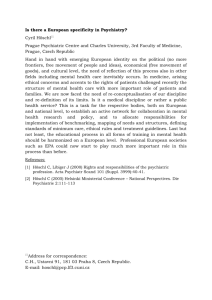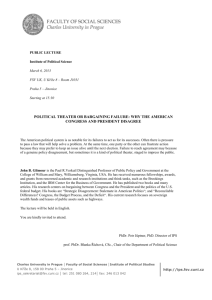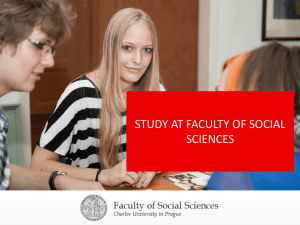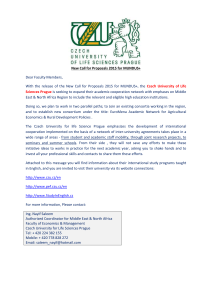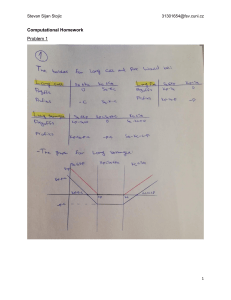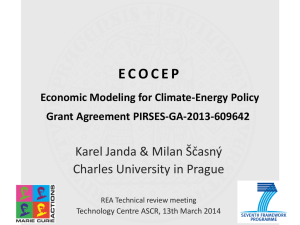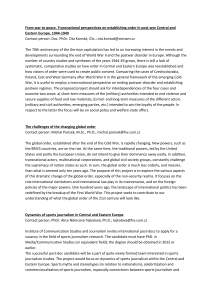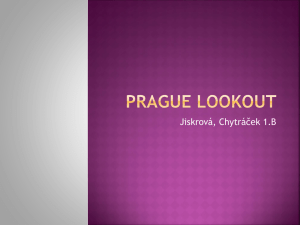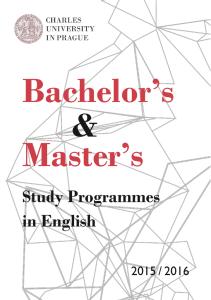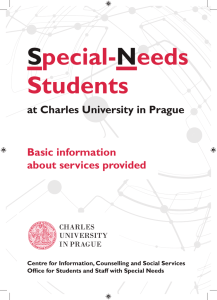PPT_PRAREAS - Department for Studies in Foreign Languages
advertisement
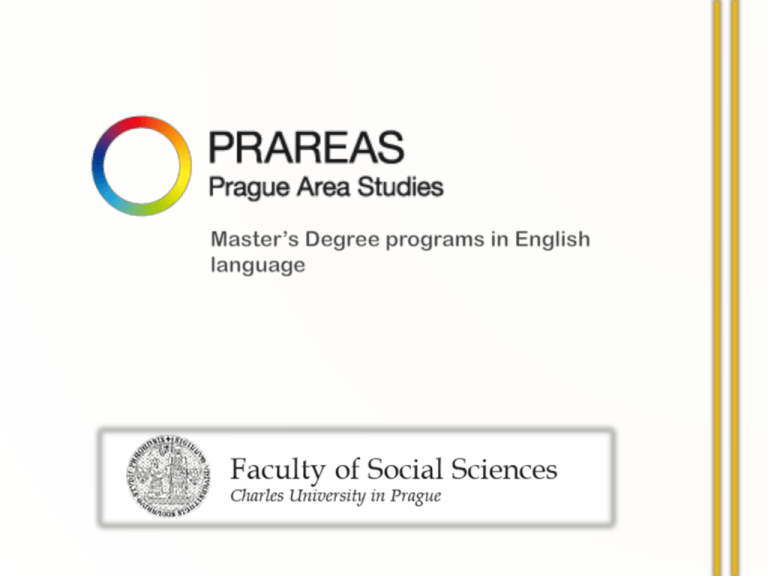
• The Faculty of Social Sciences (FSS) is one of the newest faculties of Charles University in Prague. Shortly after its creation in 1990 it became a regional centre of teaching and research in the key fields of social sciences • Currently, the Faculty has around 4 000 full-time students. Approximately 170 of them are enrolled in one of the English language degree programs • The Faculty of Social Sciences study programs focus primarily on economics, communication studies, international area studies, political science and sociology, all offered at the bachelor's, master's and doctoral level • FSS emphasizes development of foreign cooperation. Firstly, by developing and strengthening scientific bonds, student and academic mobility and, secondly, by offering English language degree programs. It has one of the highest international mobility participation rates of all the faculties of Charles University. Each year it welcomes around 500 exchange students from all over the world • Studies at FSS are intended primarily to prepare students for a professional career in the private sector, public administration, national governments, European institutions, academic research and media Institutes of FSS • Institute of Economic Studies (IES) offers education in economics and finance at a level comparable to the leading universities in Europe • Institute of International Studies (IIS) focuses on multidisciplinary research and area studies of Europe, Eurasia and North America • Institute of Political Studies (IPS) offers fullyfledged university education in political science, international relations and security studies Institutes of FSS • Institute of Communication Studies and Journalism (ICSJ) carries out scientific and research activities in the fields of media studies, journalism, marketing communication and PR • Institute of Sociological Studies (ISS) provides education and develops scientific research in the fields of sociology, social and public policy and social anthropology Other parts of FSS • Research centres of FSS o Centre for Media Studies (CEMES) o Centre for Social and Economic Strategies (CESES) • Department of Foreign Languages • Library (Scientific Information Centre) • Centre for Information and Computing Technology Institute of International Studies • • • • The Institute of International studies (IIS) is an organizational part of the Faculty of Social Sciences at Charles University in Prague. The IIS offers bachelor‘s, master‘s and doctoral degree programs in modern history and area studies. It concentrates its activities on four primary regions: the countries of the former Soviet Union and East-Central Europe, the German-speaking countries of Central Europe, Western Europe and North America The IIS consists of 4 departments: o Department of Russian and East European Studies; o Department of American Studies; o Department of German and Austrian Studies; o Department of West European Studies; Institute of International Studies • Each of the regions is covered by one department of the Institute, which runs a 2-year English language Master's Degree program. The following four English language Master's Degree programs offered by the Institute of International Studies are coordinated under the label "Prague Area Studies" (PRAREAS): - Balkan, Eurasian and Central European Studies - Central European Comparative Studies - European Studies - Transatlantic Studies • Tuition fee: 6000 EUR per academic year in all programs Balkan, Eurasian and Central European Studies • The BECES program addresses the English-speaking audience with a deep and versatile exploration of “the East”, understood as a territory composed of Central Europe, the Balkan peninsula, and the Post-Soviet area, including the Caucasus and Central Asia • Primary attention is paid to modern history, politics and diplomacy, as well as to fundamental social, cultural and economic problems • Students can choose among one of three offered specializations: o Balkans; o Central Europe (including Baltic countries); o Post-Soviet area. In this program, students are offered the chance to learn or improve their knowledge of the Czech language and some other languages of the area of this specific specialization • Central European Comparative Studies • • • • The CECS program focuses on the region composed of Germany, Austria and the Visegrad countries (the Czech Republic, Slovakia, Poland and Hungary) with an overlap onto neighboring countries It offers a thorough comparative and multidisciplinary understanding of the historical, political, economic and cultural developments of the above listed countries CECS program also offers students the chance to learn or improve their knowledge of some of the Slavonic languages of the area The program is offered either in the form of a full-time study or as a part-time study (optimized for working people and with classes on Friday afternoons) European Studies • • • The ES interdisciplinary program provides students with a profound knowledge and understanding of European history and politics, the European integration process and other EU related issues from a legal, political and economic perspective from a Central European point of view The program focuses not only on the developments in the EU member states but offers a study of the European integration process in all its complexity and variety The ES are designed especially or students who plan to enter positions in EU institutions, international organizations, national administration or nongovernmental organizations Transatlantic Studies • • • This program’s focus is to provide English-speaking students with deep, interdisciplinary knowledge of transatlantic relations since 1945. The security commitments entered into by the United States after the Second World War represented a turning point in American history The post-1945 changes deeply impacted the political and cultural relations of the United States and the rest of the world. Close attention is paid to history, politics, and diplomacy, so that students can understand the changing nature of transatlantic relations during the different phases of the Cold War and afterward Prague is an excellent place to study the issue because the Czechs underwent a transformation from being a nation subjugated by the Soviet Union during the Cold War to one that is a full member of NATO and the European Union Spring University Title for 2014: East goes west - West goes east? Searching for a new European order after 1990 • takes place in April • The objective of the Spring University Prague 2014, “East goes west - West goes east? Searching for a new European order after 1990”, is to provide students with a broad understanding of the political, economic, social, and cultural development of Europe after 1990. The course provides an interdisciplinary approach and combines multiple learning methods, such as lectures, workshops, roundtable discussions, group-work and student presentations. • fee: 770 EUR (for everything) • http://spring-university.fsv.cuni.cz Summer University Title for 2014: Reconfiguring Europe: an Old Continent in a New Millenium • takes place in September • The objective of the Summer University Prague 2014, “Reconfiguring Europe: an Old Continent in a New Millennium”, is to provide students with a broad understanding of the most significant recent and current political, economic and social issues in Europe. The course provides an interdisciplinary approach and combines multiple learning methods, such as lectures, workshops, round-table discussions, group-work and student presentations. • fee: 930 EUR (for everything) • http://summer-university.fsv.cuni.cz Nationalism, Religion and Violence in Europe Summer School • • • • • • • The Nationalism, Religion and Violence Summer School (NRVSS) is organized by Charles University in Prague and International Hellenic University in Thessaloniki since 2013, supported by the LSE and PRIO. One year it takes place in Prague, another year in Thessaloniki. A key goal of the NRVSS is to contribute in a substantial way to the study of violence and to catalyze the growth of the study of violence as a field. led by the best international researchers in the field bringing together lecturers from the most prestigious universities such as Oxford, NYU or LSE targeting students and graduates of Political Science, History, Anthropology, International Relations, International Law, Journalism & other related disciplines course for both undergraduates, (post)graduate students and activists taking place at the oldest university in Central Europe tuition fee: 750 EUR http://nrvsschool.fsv.cuni.cz • The PRAREAS team organizes also different out-of-school activites for our students: o cultural events – trips within the Czech Republic, exhibitions, cinema, theatre, concerts… o other more casual events: bowling, pubs, parties, meeting with Czech students or another foreign exchange students… • Charles University has its own International club – for foreign students: o buddy system; o orientation week; o tandem program – learning languages; o www.ic-cuni.cz • The application deadline for the academic year 2015/16 is April 30, 2015 for all Prague Area Studies programs • For further information visit PRAREAS webpage: http://imseng.fsv.cuni.cz/prareas • You can also contact our staff at: prareas@fsv.cuni.cz (academic coordination) svoz@fsv.cuni.cz (Lukáš Martin, technical, visa, accommodation etc.) • Or directly the program coordinators: BECES: Jiří Vykoukal jiri.vykoukal@post.cz CECS: Tomáš Nigrin nigrin@fsv.cuni.cz ES: Ľubica Debnárová debnarou@fsv.cuni.cz TS: Petr Anděl petr_andelcz@yahoo.com
